a&e features
Cait, AbFab, ‘Will & Grace’ dominate 2016 entertainment news
Wonder Woman, Beyonce, Ellen also keep tongues wagging
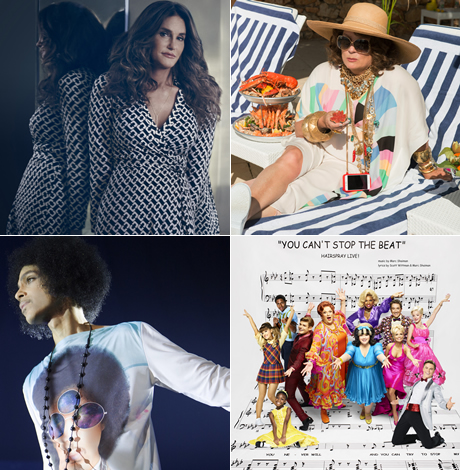
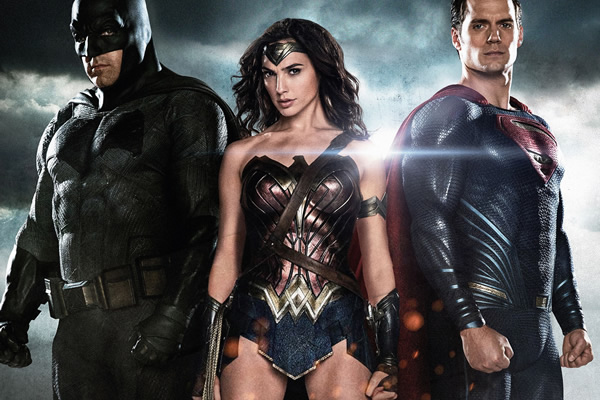
(Photo courtesy NBC)
Wonder Woman is a beloved superhero for many but her big screen glory wasn’t embraced until this year. Audiences received their first glimpse of the Amazonian warrior, portrayed by Gal Gadot, in “Batman V Superman: Dawn of Justice” in March. While the role was brief, hype surrounding her solo film “Wonder Woman,” to be released on June 2, 2017, began this year with clips and a trailer.
If this year’s brief sighting wasn’t enough there will be plenty of Wonder Woman in the coming years with Gadot appearing as Wonder Woman in “Justice League” on Nov. 17, 2017 and in “Justice League 2” in 2019.
Meanwhile ‘70s TV Wonder Woman Lynda Carter brought her “Long-Legged Woman” show to the Kennedy Center in April. She sings there regularly.
# 9: NBC debuts “Hairspray: Live!”
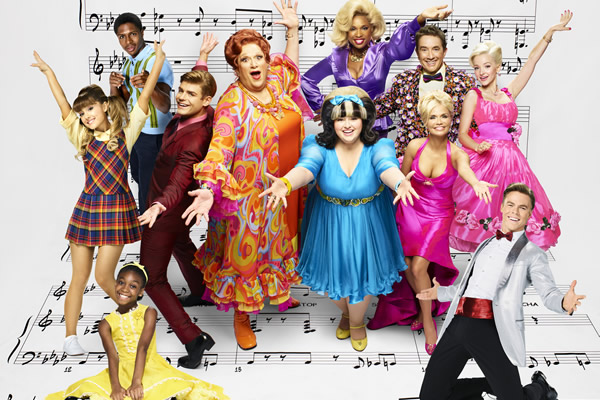
(Photo courtesy Fox Searchlight)
NBC continued its tradition of live, television musicals with “Hairspray Live!” on Dec. 3. The musical was an adaptation of the 2002 Broadway musical version, not the John Waters original film nor the 2007 remake, with Harvey Fierstein penning the teleplay and reprising his role as Edna Turnblad. Big names like Ariana Grande, Jennifer Hudson, Kristin Chenoweth, Martin Short, Rosie O’Donnell and Sean Hayes bolstered the cast, but newcomer Maddie Baillio held her own in the starring role of Tracy Turnblad.
While there were plenty of slips during the airing, the mic frequently cut out and a cameraman sadly cut Chenoweth out of a final bow, it had plenty of charm. There were boisterous musical numbers and live, ‘60s-themed commercials for Oreo, Reddi Wip and Toyota throughout the broadcast adding the right amount of old school charm. Relive the experience, or take it in for the first time, with an encore airing on Dec. 26 from 8-11 p.m.
#8: ‘Absolutely Fabulous’ returns

Jennifer Saunders in ‘Absolutely Fabulous the Movie’ (Photo courtesy NBC)
“Absolutely Fabulous” revived itself once again for a feature-length movie that hit theaters in July. Jennifer Saunders and Joanna Lumley brought back their characters Edina Monsoon and Patsy Stone, this time to accidentally kill Kate Moss and hide out in the south of France. The movie had plenty of celebrity cameos including Graham Norton, Daniel Lismore, Dame Edna Everage and Joan Collins.
The ‘90s BBC comedy always seemed to make a comeback with a revived series from 2001-2004 and 20th anniversary specials in 2011 and 2012. This time Saunders revealed to the Daily Mail the party is finally over for Edina and Patsy.
“I’m not doing anything more with ‘Ab Fab.’ That’s it,” Saunders says. “That. Is. It. I can’t see the point of doing anything else with it, really.”
#7: ‘I Am Cait’ cancelled

Caitlyn Jenner (Photo courtesy Wikimedia Commons)
Caitlyn Jenner took the world by storm in 2015, but 2016 proved to be a quieter year for the former Olympian, and the ratings for “I Am Cait” were hit hard by the dip in interest. A spin-ff from “Keeping Up with the Kardashians,” the first season of “I Am Cait” focused on Jenner and her family coming to terms with publicly living her life as a transgender woman. While viewers tuned in to see Jenner share emotional moments with her children and confront her ex-wife Kris Jenner, the second season shifted in tone. It followed Jenner and a group of her transgender friends on a road trip across the U.S. advocating for transgender rights.
Having more of a political focus, the second season’s storylines focused on Jenner’s conservative views clashing with her friends’ more liberal politics. Side storylines with Jenner’s friends including Candis Cayne, Ella Giselle, Chandi Moore and Kate Bornstein also took up more screen time than before. Exactly why the show hit low ratings isn’t exactly known but E! and Jenner announced the show’s cancellation in August.
# 6: Colton Haynes, Kristen Stewart, Shepherd Smith come out
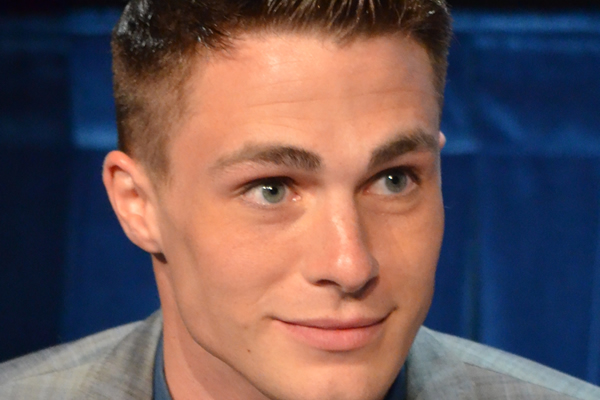
Colton Haynes (Photo courtesy LOGO)
Celebrities chose 2016 to be honest about their sexual orientation with some choosing to directly address it and others simply no longer hiding.
Actor Colton Haynes’ sexual orientation was frequently speculated about after photos surfaced of him appearing in gay magazine XY. When a fan referenced Haynes’ “secret gay past” on Tumblr in January, Haynes responded nonchalantly by saying, “Was it a secret?” The “Arrow” star officially came out in an interview with Entertainment Weekly in May explaining that his anxiety about coming out prevented him from doing so earlier.
Kristen Stewart became more open about her relationships with women in 2016. In March, French musician Soko confirmed that she was in a relationship with Stewart. The actress moved on to date her former assistant Alicia Cargile and confirmed they were together in an interview with Elle UK. Stewart told Elle UK when she was dating a guy, hinting at her highly publicized relationship with actor Robert Pattinson, that they were “turned into these characters and placed into this ridiculous comic book.” Now, dating a woman she said, “Right now I’m just really in love with my girlfriend. We’ve broken up a couple of times and gotten back together, and this time I was like, ‘Finally, I can feel again.’”
Fox News anchor Shepard Smith quietly “came out” in an interview with the Huffington Post in October. While being questioned if his former boss Roger Ailes had ever stopped him from coming out publicly, Smith denied it while confirming his sexual orientation.
“That’s not true,” Smith said. “He was as nice as he could be to me. I loved him like a father.
#5: ‘Finding Prince Charming’ becomes a hit
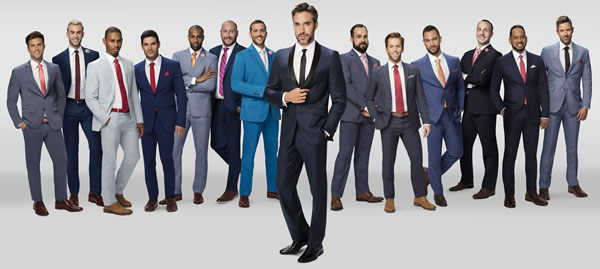
(Photo courtesy of LOGO)
“Finding Prince Charming” proved that gays can follow the dating reality show formula with the best of them. Modeled after “The Bachelor,” the show pitted 13 male suitors in competition for the affection of Atlanta-based interior designer Robert Sepúlveda Jr. The show included plenty of nasty, spit-flinging brawls, “I’m-not-here-to-make-friends” mentalities and lots of “OMG-I-can’t-believe-I’m-falling-in-love-so-fast” revelations. As a host who serves as a soundboard for the bachelor, Lance Bass grilled Sepúlveda on which way his heart was leaning each episode, and emotional tie eviction ceremonies (the equivalent of a “The Bachelor” rose ceremony) to complete the age-old dating show. Bombshell secrets were also dropped throughout, like Sepúlveda’s past as a sex worker in his ‘20s coming to light.
The formula worked for both Sepúlveda and LOGO as the bachelor asked Eric to “keep his tie” for an exclusive relationship and LOGO scored high ratings. The show will be back for a second season.
#4: DeGeneres receives Medal of Freedom
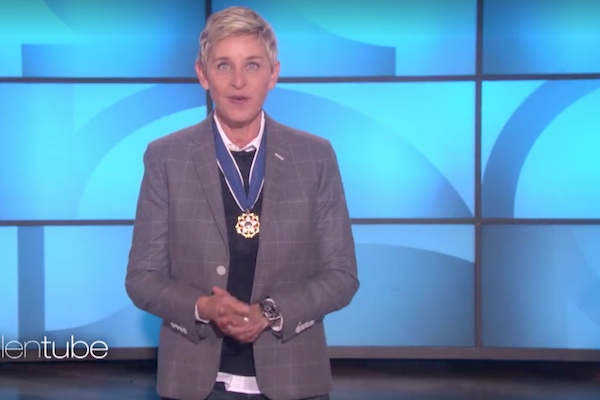
(Image courtesy NBC)
Ellen DeGeneres was presented with the Presidential Medal of Freedom by President Obama in an emotional ceremony for the comedian in November. Obama noted that DeGeneres was courageous to come out 20 years ago and reminded everyone that the result was the cancellation of her sitcom “Ellen.” However, her persistence in the industry led her to have the success she has achieved today.
“Again and again, Ellen DeGeneres has shown us that a single individual can make the world a more fun, more open, more loving place, so long as we just keep swimming,” Obama said at the ceremony. DeGeneres visibly teared up when Obama placed the medal around her neck.
The monumental moment wasn’t without some DeGeneres antics. The comedian was denied entry into the White House when she forgot to bring her ID. Waiting outside in Layette Park, DeGeneres tweeted the ordeal with a picture of her sitting forlornly on a bench. Eventually, she was allowed inside where she took on the Mannequin Challenge with fellow honoree Diana Ross.
#3: Hollywood turns out for Hillary
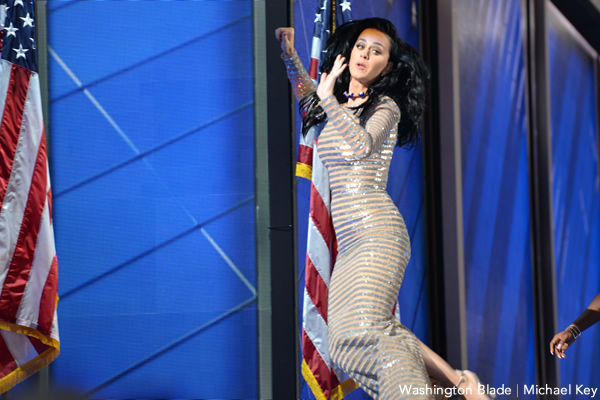
Katy Perry performs at the Democratic National Convention. (Washington Blade photo by Michael Key)
Hillary Clinton’s presidential run proved she was, mostly, the celebrities’ president. Many stars voiced their support for Clinton in the 2016 election from musicians to actors. Cher publicly campaigned for Clinton, frequently tweeting her support and appearing at campaign events. Demi Lovato joined Clinton on the campaign trail during the primaries and appeared at the Democratic National Convention. Ellen DeGeneres also proclaimed herself a Clinton supporter on her talk show. Elton John and Katy Perry both performed at Clinton fundraisers during the campaign. Lady Gaga and Perry attended Clinton’s election watch party and Lady Gaga stood in solidarity with Clinton by protesting outside Trump Tower after Donald Trump was announced President-elect.
The election also brought back beloved sitcom “Will & Grace.” Will, Grace, Jack and Karen all returned for a 10-minute minisode based on the election. While the minisode wasn’t specifically pro-Clinton, the cast did appear to support Clinton in song at a fundraiser. Debra Messing, Sean Hayes, Eric McCormack and Megan Mullally sang a song bashing Trump to the tune of “Officer Krupke” from “West Side Story.”
#2: Beyoncé serves up ‘Lemonade’
Without warning, Beyoncé dropped the music video for “Formation” on Feb. 6 for what would become the first single from her sixth studio visual album “Lemonade.” Beyoncé performed “Formation” at the Super Bowl half-time show and drew criticism for the Black Panther-themed performance.
“Lemonade” was released on April 23 as an album and a one-hour concept film, which aired on HBO. The album mixed hip-hop, rock, reggae, pop, country and gospel. The songs caused a buzz about Beyoncé’s marriage with Jay-Z, many were left wondering “Who is Becky with the good hair?,” and how much of the album was truth or art.
“Lemonade” became a critical think piece darling among music critics and was praised for its unapologetically, pro-black narrative of love, womanhood and heartbreak. “Saturday Night Live” spoofed the album twice with its skits “The Day Beyoncé Turned Black” and “Melanianade,” a “Lemonade” performance with Melania Trump in Beyoncé’s role. “Lemonade” also earned nine Grammy nominations making Beyoncé the woman with the most Grammy nominations of all time.
#1: Saying goodbye to David Bowie, Prince

David Bowie (Photo by Jorge Barrios; courtesy Wikimedia Commons)
Legendary musicians David Bowie and Prince died this year leaving behind legacies that experimented with sound, toyed with androgyny in fashion and left their mark on culture.
Bowie rocked the charts beginning in 1969 with his hit “Space Oddity,” but fully emerged as his glam rock, androgynous alter ego Ziggy Stardust in 1972 with his hit “Starman.” As Ziggy Stardust, Bowie donned face paint and exuberant costumes. He confessed to being both gay and bisexual before admitting he was a “closet heterosexual” in a 1983 interview with Rolling Stone. The British singer died from liver cancer on Jan. 10 just two days after the release of his final album “Blackstar.”
Prince’s death from an accidental fentanyl opiod overdose on April 21 shocked the world with the loss of one of the best-selling artists of all time. Considered a sex symbol since his breakout album, Prince consistently mixed his sexually explicit lyrics, soft voice and androgyny to create a music persona unlike any other. The music from his 1984 musical film “Purple Rain” earned him two Grammys and an Oscar. The singer stayed active in music until his death, performing show dates for his “Piano & a Microphone Tour” up until a week before his death.
HONORABLE MENTION: Violet Chachki’s grand-yet-decadent gown at the season eight finale of “RuPaul’s Drag Race” in May had the whole world gagging.
DISHONORABLE MENTION: “The Real O’Neals” star Noah Galvin (he plays gay and is gay himself) stumbles big time in a June Vulture interview in which he trashed Colton Haynes, Eric Stonestreet (“Modern Family”) and director Bryan Singer. He later apologized.
a&e features
Eastern Shore chef named James Beard Finalist
Harley Peet creates inventive food in an inclusive space

In a small Eastern Shore town filled with boutiques, galleries, and the occasional cry of waterfowl from the Chesapeake, Chef Harley Peet is most at home. In his Viennese-inflected, Maryland-sourced fine-dining destination Bas Rouge, Peet draws from his Northern Michigan upbringing, Culinary Institute of America education, and identity as a gay man, for inspiration.
And recently, Peet was named a James Beard Finalist for Best Chef: Mid-Atlantic – the first “Best Chef: Mid-Atlantic” finalist representing the Eastern Shore.
Peet, after graduation from the Culinary Institute of America, took a position as sous chef at Tilghman Island Inn, not far from Bas Rouge. Falling in love with the Eastern Shore, he continued his passion for racing sailboats, boating, gardening, and fishing, and living his somewhat pastoral life as he opened Bas Rouge in 2016 as head chef, a restaurant part of the Bluepoint Hospitality group, which runs more than a dozen concepts in and around Easton, Md.
Coming from a rural area and being gay, Peet knew he had his work cut out for him. He was always aware that the service and hospitality industry “can be down and dirty and rough.”
Now as a leader in the kitchen, he aims to “set a good example, and treat people how I want to be treated. I also want to make sure if you’re at our establishment, I’m the first to stand up and say something.”
The Bas Rouge cuisine, he says, is Contemporary European. “I’m inspired by old-world techniques of countries like Austria, Germany, and France, but I love putting a new spin on classic dishes and finding innovative ways to incorporate the bounty of local Chesapeake ingredients.”
His proudest dish: the humble-yet-elevated Wiener Schnitzel. “It is authentic to what one would expect to find in Vienna, down to the Lingonberries.” From his in-house bakery, Peet dries and grinds the housemade Kaiser-Semmel bread to use as the breadcrumbs.
Peet works to support the LGBTQ community inside and outside of the kitchen. “I love that our Bluepoint Hospitality team has created welcoming spaces where our patrons feel comfortable dining at each of our establishments. Our staff have a genuine respect for one another and work together free of judgment.”
Representing Bluepoint, Peet has participated in events like Chefs for Equality with the Human Rights Campaign, advocating for LGBTQ rights.
At Bas Rouge, Peet brings together his passion for inclusion steeped in a sustainability ethic. He sees environmental stewardship as a way of life. Peet and his husband have lived and worked on their own organic farm for several years. Through research in Europe, he learned about international marine sourcing. Witnessing the impacts of overfishing, Peet considers his own role in promoting eco-friendly practices at Bas Rouge. To that end, he ensures responsible sourcing commitments through his purveyors, relationships that have helped create significant change in how people dine in Easton.
“I have built great relationships in the community and there’s nothing better than one of our long-standing purveyors stopping in with a cooler of fresh fish from the Chesapeake Bay. This goes especially for catching and plating the invasive blue catfish species, which helps control the species’ threat to the local ecosystem.
Through his kitchen exploits, Peet expressed a unique connection to another gay icon in a rural fine-dining restaurant: Patrick O’Connell, of three Michelin starred Inn at Little Washington. In fact, Peet’s husband helped design some of O’Connell’s kitchen spaces. They’ve both been able to navigate treacherous restaurant-industry waters, and have come out triumphant and celebrated. Of O’Connell, Peet says that he “sees [his restaurants] as canvas, all artistry, he sees this as every night is a show.” But at the same time, his “judgment-free space makes him a role model.”
Being in Easton itself is not without challenges. Sourcing is a challenge, having to either fly or ship in ingredients, whereas urban restaurants have the benefit of trucking, he says. The small town “is romantic and charming,” but logistics are difficult – one of the reasons that Peet ensures his team is diverse, building in different viewpoints, and also “making things a hell of a lot more fun.”
Reflecting on challenges and finding (and creating) space on the Eastern Shore, Peet confirmed how important it was to surround himself with people who set a good example, and “if you don’t like the way something is going … move on.”
a&e features
What to expect at the 2024 National Cannabis Festival
Wu-Tang Clan to perform; policy discussions also planned

(Editor’s note: Tickets are still available for the National Cannabis Festival, with prices starting at $55 for one-day general admission on Friday through $190 for a two-day pass with early-entry access. The Washington Blade, one of the event’s sponsors, will host a LGBTQIA+ Lounge and moderate a panel discussion on Saturday with the Mayor’s Office of LGBTQ Affairs.)
With two full days of events and programs along with performances by Wu-Tang Clan, Redman, and Thundercat, the 2024 National Cannabis Festival will be bigger than ever this year.
Leading up to the festivities on Friday and Saturday at Washington, D.C.’s RFK Stadium are plenty of can’t-miss experiences planned for 420 Week, including the National Cannabis Policy Summit and an LGBTQ happy hour hosted by the District’s Black-owned queer bar, Thurst Lounge (both happening on Wednesday).
On Tuesday, the Blade caught up with NCF Founder and Executive Producer Caroline Phillips, principal at The High Street PR & Events, for a discussion about the event’s history and the pivotal political moment for cannabis legalization and drug policy reform both locally and nationally. Phillips also shared her thoughts about the role of LGBTQ activists in these movements and the through-line connecting issues of freedom and bodily autonomy.
After D.C. residents voted to approve Initiative 71 in the fall of 2014, she said, adults were permitted to share cannabis and grow the plant at home, while possession was decriminalized with the hope and expectation that fewer people would be incarcerated.
“When that happened, there was also an influx of really high-priced conferences that promised to connect people to big business opportunities so they could make millions in what they were calling the ‘green rush,'” Phillips said.
“At the time, I was working for Human Rights First,” a nonprofit that was, and is, engaged in “a lot of issues to do with world refugees and immigration in the United States” — so, “it was really interesting to me to see the overlap between drug policy reform and some of these other issues that I was working on,” Phillips said.
“And then it rubbed me a little bit the wrong way to hear about the ‘green rush’ before we’d heard about criminal justice reform around cannabis and before we’d heard about people being let out of jail for cannabis offenses.”
“As my interests grew, I realized that there was really a need for this conversation to happen in a larger way that allowed the larger community, the broader community, to learn about not just cannabis legalization, but to understand how it connects to our criminal justice system, to understand how it can really stimulate and benefit our economy, and to understand how it can become a wellness tool for so many people,” Phillips said.
“On top of all of that, as a minority in the cannabis space, it was important to me that this event and my work in the cannabis industry really amplified how we could create space for Black and Brown people to be stakeholders in this economy in a meaningful way.”

“Since I was already working in event production, I decided to use those skills and apply them to creating a cannabis event,” she said. “And in order to create an event that I thought could really give back to our community with ticket prices low enough for people to actually be able to attend, I thought a large-scale event would be good — and thus was born the cannabis festival.”
D.C. to see more regulated cannabis businesses ‘very soon’
Phillips said she believes decriminalization in D.C. has decreased the number of cannabis-related arrests in the city, but she noted arrests have, nevertheless, continued to disproportionately impact Black and Brown people.
“We’re at a really interesting crossroads for our city and for our cannabis community,” she said. In the eight years since Initiative 71 was passed, “We’ve had our licensed regulated cannabis dispensaries and cultivators who’ve been existing in a very red tape-heavy environment, a very tax heavy environment, and then we have the unregulated cannabis cultivators and cannabis dispensaries in the city” who operate via a “loophole” in the law “that allows the sharing of cannabis between adults who are over the age of 21.”
Many of the purveyors in the latter group, Phillips said, “are looking at trying to get into the legal space; so they’re trying to become regulated businesses in Washington, D.C.”
She noted the city will be “releasing 30 or so licenses in the next couple of weeks, and those stores should be coming online very soon” which will mean “you’ll be seeing a lot more of the regulated stores popping up in neighborhoods and hopefully a lot more opportunity for folks that are interested in leaving the unregulated space to be able to join the regulated marketplace.”
National push for de-scheduling cannabis
Signaling the political momentum for reforming cannabis and criminal justice laws, Wednesday’s Policy Summit will feature U.S. Sens. Raphael Warnock (D-Ga.), Jeff Merkley (D-Ore.), Elizabeth Warren (D-Mass.), and Chuck Schumer (D-N.Y.), the Senate majority leader.
Also representing Capitol Hill at the Summit will be U.S. Congresswoman Eleanor Holmes Norton (D-D.C.) and U.S. Reps. Earl Blumenauer (D-Ore.) and Barbara Lee (D-Calif.) — who will be receiving the Supernova Women Cannabis Champion Lifetime Achievement Award — along with an aide to U.S. Rep. David Joyce (R-Ohio).
Nationally, Phillips said much of the conversation around cannabis concerns de-scheduling. Even though 40 states and D.C. have legalized the drug for recreational and/or medical use, marijuana has been classified as a Schedule I substance since the Controlled Substances Act was passed in 1971, which means it carries the heftiest restrictions on, and penalties for, its possession, sale, distribution, and cultivation.
The U.S. Department of Health and Human Services formally requested the drug be reclassified as a Schedule III substance in August, which inaugurated an ongoing review, and in January a group of 12 Senate Democrats sent a letter to the Biden-Harris administration’s Drug Enforcement Administration urging the agency to de-schedule cannabis altogether.
Along with the Summit, Phillips noted that “a large contingent of advocates will be coming to Washington, D.C. this week to host a vigil at the White House and to be at the festival educating people” about these issues. She said NCF is working with the 420 Unity Coalition to push Congress and the Biden-Harris administration to “move straight to de-scheduling cannabis.”
“This would allow folks who have been locked up for cannabis offenses the chance to be released,” she said. “It would also allow medical patients greater access. It would also allow business owners the chance to exist without the specter of the federal government coming in and telling them what they’re doing is wrong and that they’re criminals.”
Phillips added, however, that de-scheduling cannabis will not “suddenly erase” the “generations and generations of systemic racism” in America’s financial institutions, business marketplace, and criminal justice system, nor the consequences that has wrought on Black and Brown communities.
An example of the work that remains, she said, is making sure “that all people are treated fairly by financial institutions so that they can get the funding for their businesses” to, hopefully, create not just another industry, but “really a better industry” that from the outset is focused on “equity” and “access.”
Policy wonks should be sure to visit the festival, too. “We have a really terrific lineup in our policy pavilion,” Phillips said. “A lot of our heavy hitters from our advocacy committee will be presenting programming.”
“On Saturday there is a really strong federal marijuana reform panel that is being led by Maritza Perez Medina from the Drug Policy Alliance,” she said. “So that’s going to be a terrific discussion” that will also feature “representation from the Veterans Cannabis Coalition.”
“We also have a really interesting talk being led by the Law Enforcement Action Partnership about conservatives, cops, and cannabis,” Phillips added.
Cannabis and the LGBTQ community
“I think what’s so interesting about LGBTQIA+ culture and the cannabis community are the parallels that we’ve seen in the movements towards legalization,” Phillips said.
The fight for LGBTQ rights over the years has often involved centering personal stories and personal experiences, she said. “And that really, I think, began to resonate, the more that we talked about it openly in society; the more it was something that we started to see on television; the more it became a topic in youth development and making sure that we’re raising healthy children.”
Likewise, Phillips said, “we’ve seen cannabis become more of a conversation in mainstream culture. We’ve heard the stories of people who’ve had veterans in their families that have used cannabis instead of pharmaceuticals, the friends or family members who’ve had cancer that have turned to CBD or THC so they could sleep, so they could eat so they could get some level of relief.”
Stories about cannabis have also included accounts of folks who were “arrested when they were young” or “the family member who’s still locked up,” she said, just as stories about LGBTQ people have often involved unjust and unnecessary suffering.
Not only are there similarities in the socio-political struggles, Phillips said, but LGBTQ people have played a central role pushing for cannabis legalization and, in fact, in ushering in the movement by “advocating for HIV patients in California to be able to access cannabis’s medicine.”
As a result of the queer community’s involvement, she said, “the foundation of cannabis legalization is truly patient access and criminal justice reform.”
“LGBTQIA+ advocates and cannabis advocates have managed to rein in support of the majority of Americans for the issues that they find important,” Phillips said, even if, unfortunately, other movements for bodily autonomy like those concerning issues of reproductive justice “don’t see that same support.”
a&e features
Juliet Hawkins’s music defies conventional categorization
‘Keep an open mind, an open heart, and a willingness to evolve’
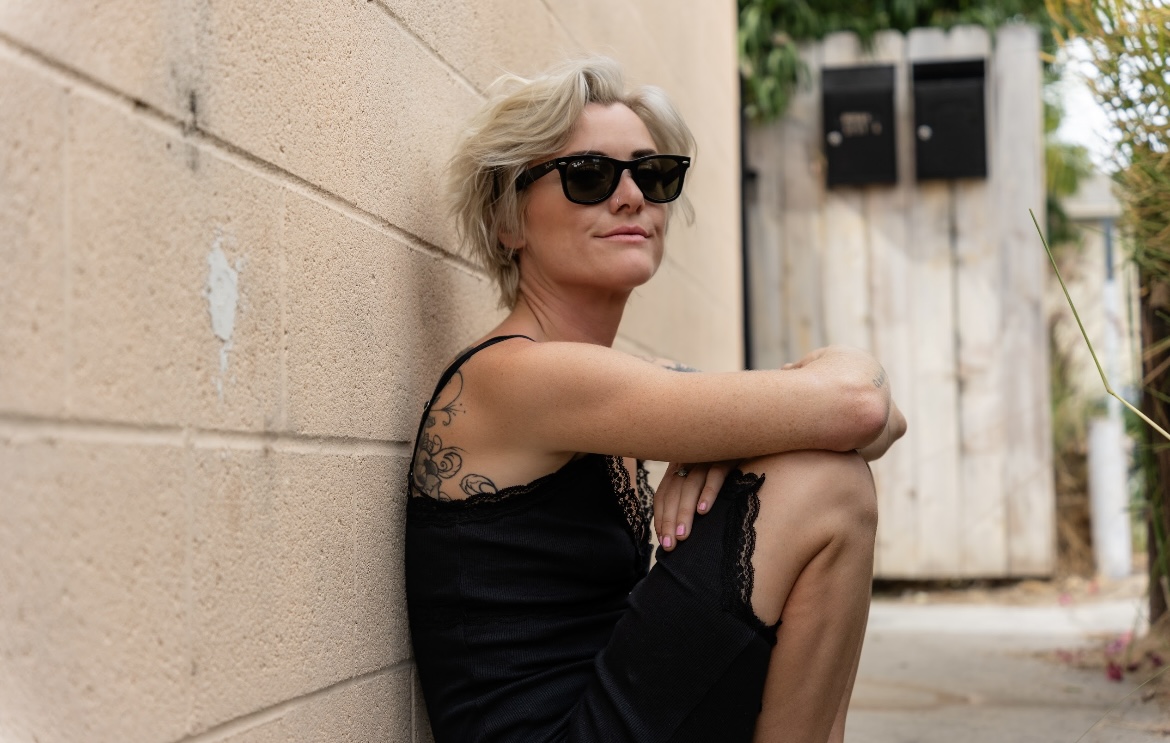
LONG BEACH, Calif. – Emerging from the dynamic music scene of Los Angeles, Juliet Hawkins seamlessly integrates deeply soulful vocals with contemporary production techniques, crafting a distinctive sound that defies conventional categorization.
Drawing inspiration from the emotive depth of Amy Winehouse and weaving together elements of country, blues, and pop, Hawkins’ music can best be described as a fusion–perhaps best termed as soulful electronica. Yet, even this characterization falls short, as Hawkins defines herself as “a blend of a million different inspirations.”
Hawkins’s musical palette mirrors her personae: versatile and eclectic. Any conversation with Hawkins makes this point abundantly clear. She exhibits the archetype of a wild, musical genius while remaining true to her nature-loving, creative spirit. Whether recording in the studio for an album release, performing live in a studio setting, or playing in front of a live audience, Hawkins delivers her music with natural grace.
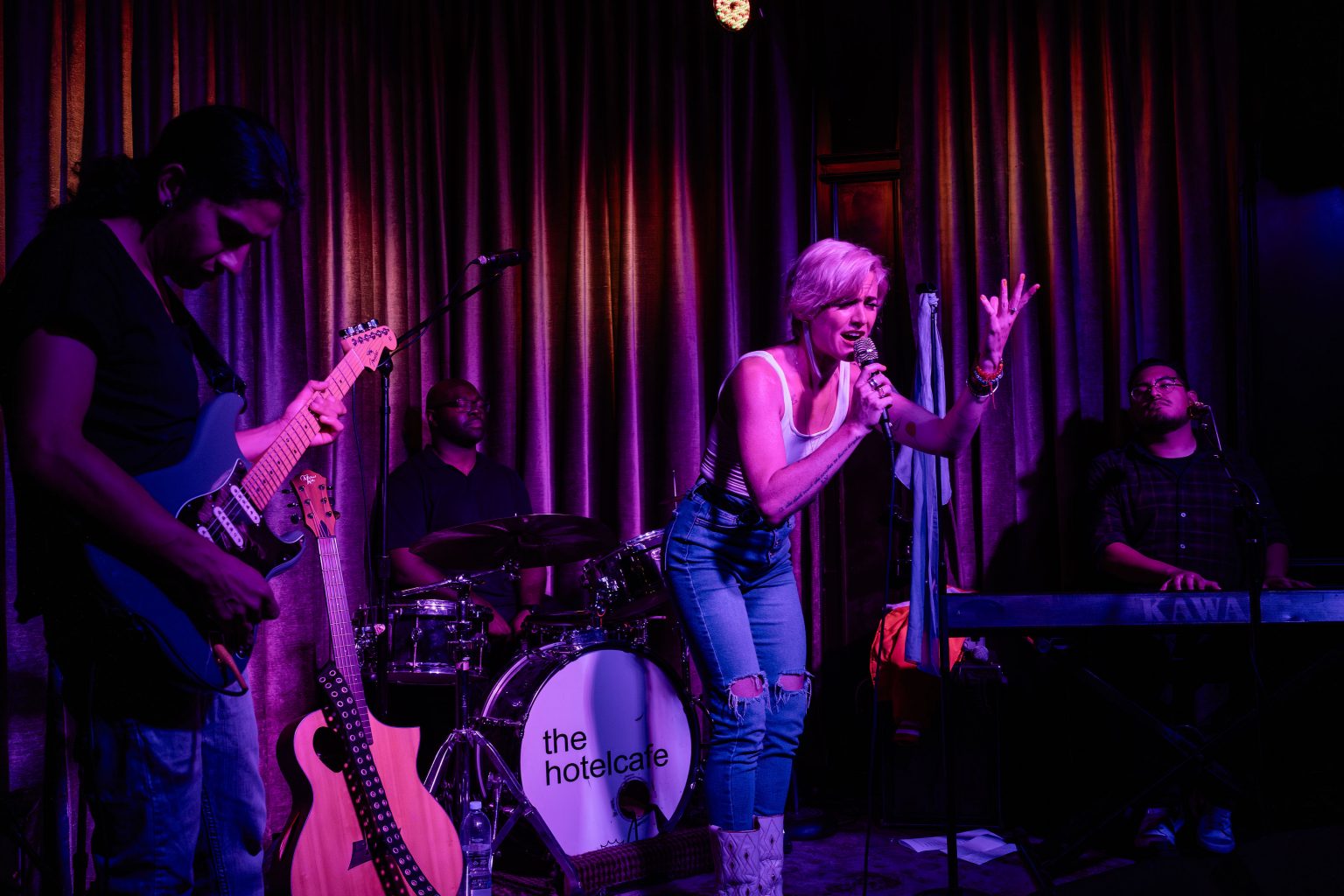
However, Hawkins’s musical journey is far from effortless. Amid personal challenges and adversity, she weaves her personal odyssey of pain and pleasure, transforming these experiences into empowering anthems.
In a candid interview with the Blade, Hawkins spoke with profound openness and vulnerability about her past struggles with opiate and heroin addiction: “That was 10 years ago that I struggled with opiates,” she shared. Yet, instead of letting her previous addiction define her, Hawkins expressed to the Blade that she harbors no shame about her past. “My newer music is much more about empowerment than recovery,” she explained, emphasizing that “writing was the best way to process trauma.”
Despite her struggles with addiction, Hawkins managed to recover. However, she emphasizes that this recovery is deeply intertwined with her spiritual connection to nature. An illustrative instance of Hawkins’ engagement with nature occurred during the COVID pandemic.
Following an impulse that many of us have entertained, she bought a van and chose to live amidst the trees. It was during this period that Hawkins composed the music for her second EP, titled “Lead with Love.”
In many ways, Hawkins deep spiritual connection to nature has been profoundly shaped by her extensive travels. Born in San Diego, spending her formative years in Massachusetts, and later moving to Tennessee before returning to Southern California, she has broadened her interests and exposed herself to the diverse musical landscapes across America.
“Music is the only thing I have left,” Hawkins confides to the Blade, highlighting the integral role that music has in her life. This intimate relationship with music is evident in her sultry and dynamic compositions. Rather than imitating or copying other artists, Hawkins effortlessly integrates sounds from some of her favorite musical influences to create something new. Some of these influences include LP, Lucinda Williams, Lana Del Rey, and, of course, Amy Winehouse, among others.
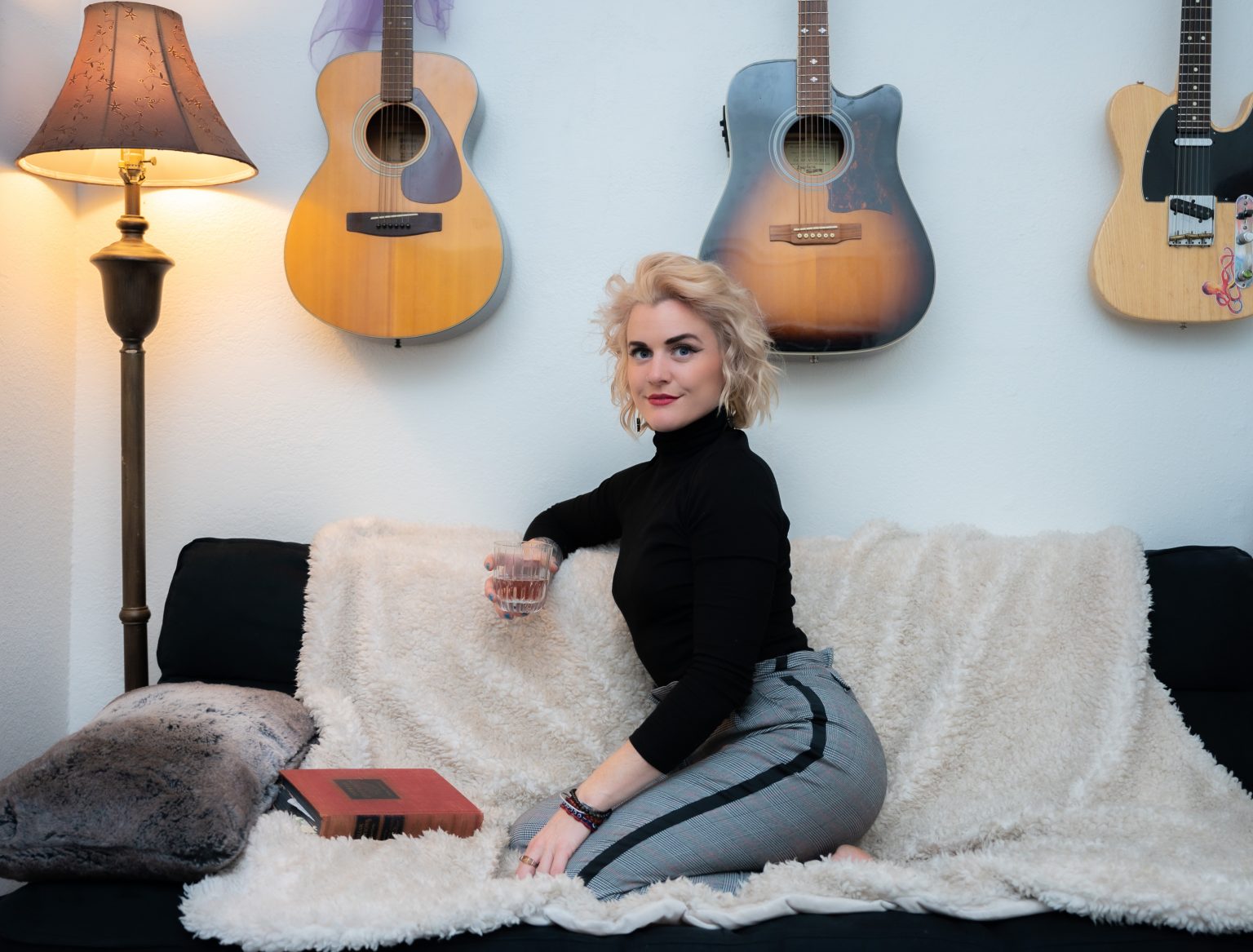
Hawkins has always been passionate about music—-she began with piano at a young age, progressed to guitar, and then to bass, eagerly exploring any instrument she could get her hands on. However, instead of following a traditional path of formalized lessons and structured music theory, Hawkins told the Blade that she “has a hard time following directions and being told what to do.”
This independent approach has led her to experiment with various genres and even join unexpected groups, such as a tribute band for Eric Clapton and Cream. While she acknowledges that her eclectic musical interests might be attributed to ADHD, she holds a different belief: “Creative minds like to move around.”
When discussing her latest musical release — “Stay True (the live album)” which was recorded in a live studio setting — Hawkins describes the experience as a form of improvisation with both herself and the band:
“[The experience] was this divine honey that was flowing through all of us.” She explains that this live album was uncertain in the music’s direction. “For a couple of songs,” Hawkins recalls, “we intuitively closed them out.” By embracing creative spontaneity and refusing to be constrained by fear of mistakes, the live album authentically captures raw sound, complete with background chatter, extended outros, and an extremely somber cover of Ozzy Osbourne’s “Crazy Train” coupled with a slow piano and accompanied strings.
While “Stay True” was a rewarding experience for Hawkins, her favorite live performance took place in an unexpected location—an unattended piano in the middle of an airport. As she began playing Beethoven’s “Moonlight Sonata”, Hawkins shared with the Blade a universal connection we all share with music: “This little girl was dancing as I was playing.”
After the performance, tears welled in Hawkins’ eyes as she was touched by the young girl’s appreciation of her musicianship. Hawkins tells the Blade, “It’s not about playing to an audience—it’s about finding your people.”
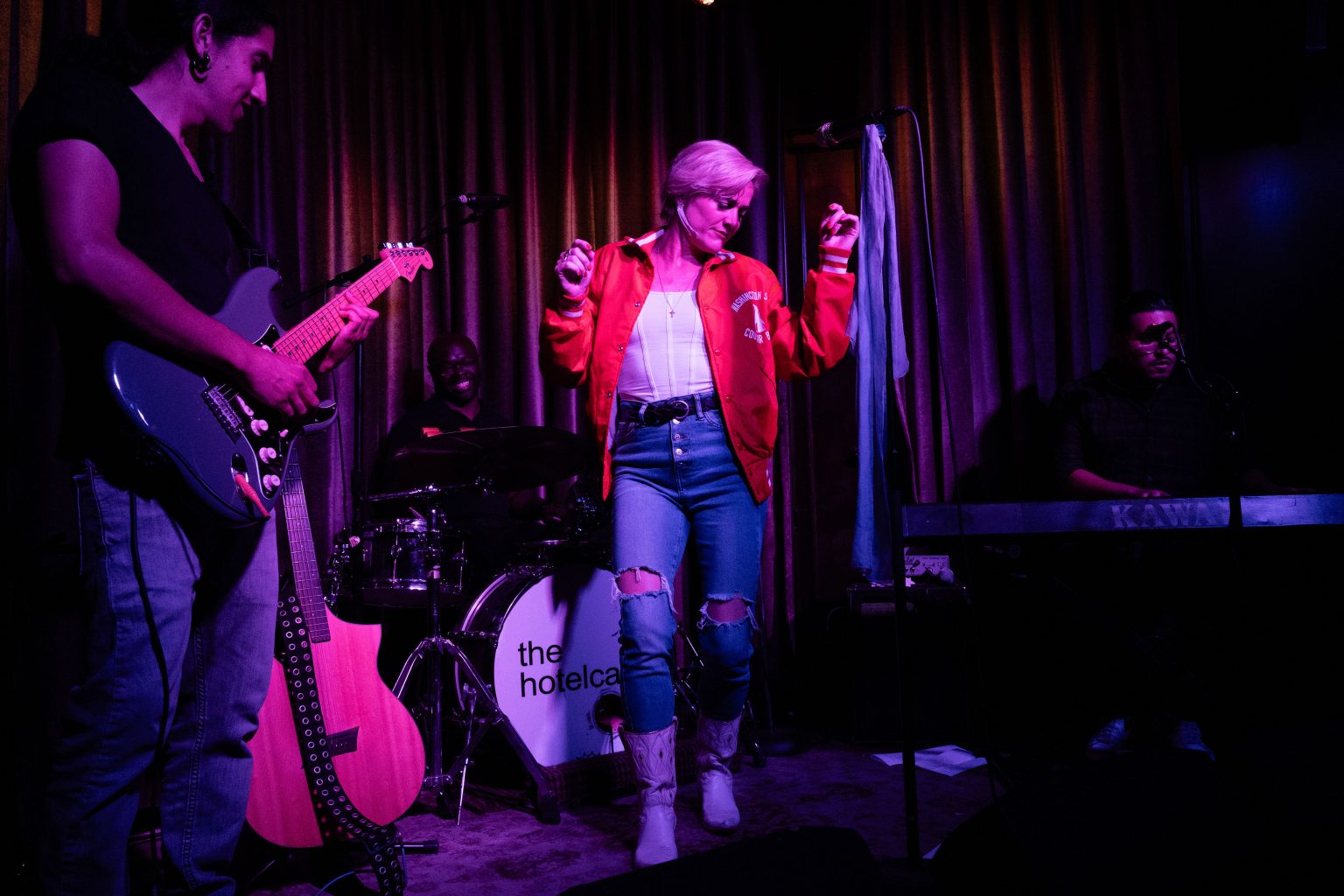
What sets Hawkins apart as an artist is her ability to connect with her audience in diverse settings. She highlights EDC, an electronic dance music festival, as a place where she unabashedly lets her “freak flag” fly and a place to connect with her people. Her affinity for electronic music not only fuels her original pop music creations, but also inspires her to reinterpret songs with an electronic twist. A prime example of this is with her electronic-style cover of Tal Bachman’s 90’s hit, “She’s So High.”
As an openly queer woman in the music industry, Hawkins is on a mission to safeguard artistic integrity. In songs like “My Father’s Men,” she bares her vulnerability and highlights the industry’s misogyny, which often marginalizes gender minorities in their pursuit of artistic expression.
She confides to the Blade, “The industry can be so sexist, misogynist, and oppressive,” and points out that “there are predators in the industry.” Yet, rather than succumbing to apathy, Hawkins is committed to advocating for gender minorities within the music industry.
“Luckily, people are rising up against misogyny, but it’s still there. ‘My Father’s Men’ is a message: It’s time for more people who aren’t just white straight men to have a say.”
Hawkins is also an activist for other causes, with a fervent belief in the preservation of bodily autonomy. Her self-directed music video “I’ll play Daddy,” showcases the joy of embracing one’s body with Hawkins being sensually touched by a plethora of hands. While the song, according to Hawkins, “fell upon deaf ears in the south,” it hasn’t stopped Hawkins from continuing to fight for the causes she believes in. In her interview, Hawkins encapsulated her political stance by quoting an artist she admires:
“To quote Pink, ‘I don’t care about your politics, I care about your kids.’”
When Hawkins isn’t writing music or being a champion for various causes, you might catch her doing the following: camping, rollerblading, painting, teaching music lessons, relaxing with Bernie (her beloved dog), stripping down for artsy photoshoots, or embarking on a quest to find the world’s best hollandaise sauce.
But at the end of the day, Hawkins sums up her main purpose: “To come together with like-minded people and create.”
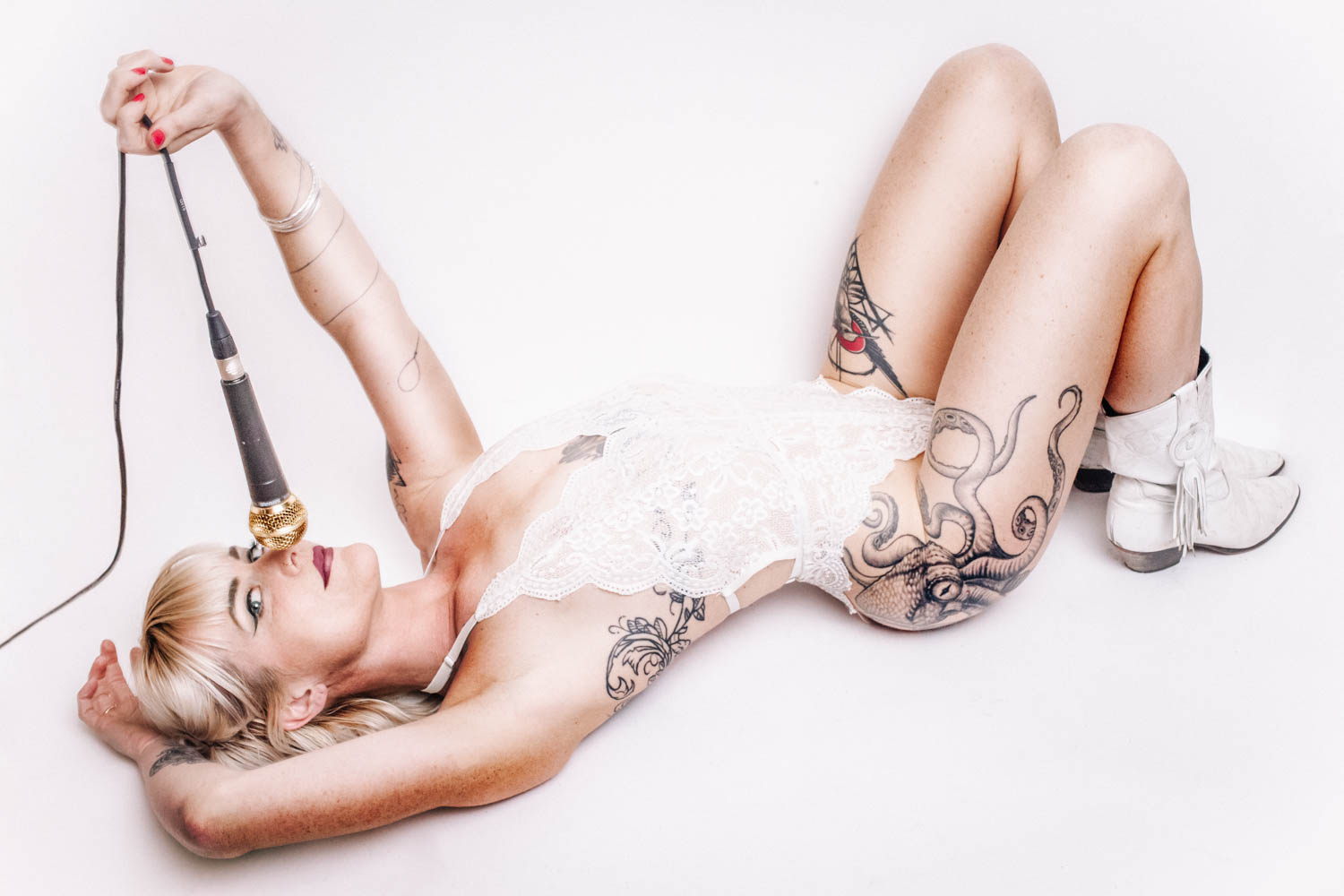
Part of this ever-evolving, coming-of-age-like journey includes an important element: plant-based medicine. Hawkins tells the Blade that she acknowledges her previous experience with addiction and finds certain plants to be useful in her recovery:
“The recovery thing is tricky,” Hawkins explains, “I don’t use opiates—-no powders and no pills—but I am a fan of weed, and I think psilocybin can be helpful when used at the right time.” She emphasizes the role of psychedelics in guiding her towards her purpose. “Thanks for psychedelics, I have a reignited sense of purpose … Music came naturally to me as an outlet to heal.”
While she views the occasional dabbling of psychedelics as a spiritual practice, Hawkins also embraces other rituals, particularly those she performs before and during live shows. “I always carry two rocks with me: a labradorite and a tiger’s eye marble,” she explains.
-

 State Department3 days ago
State Department3 days agoState Department releases annual human rights report
-

 Maryland4 days ago
Maryland4 days agoJoe Vogel campaign holds ‘Big Gay Canvass Kickoff’
-

 Politics3 days ago
Politics3 days agoSmithsonian staff concerned about future of LGBTQ programming amid GOP scrutiny
-

 District of Columbia20 hours ago
District of Columbia20 hours agoCatching up with the asexuals and aromantics of D.C.






